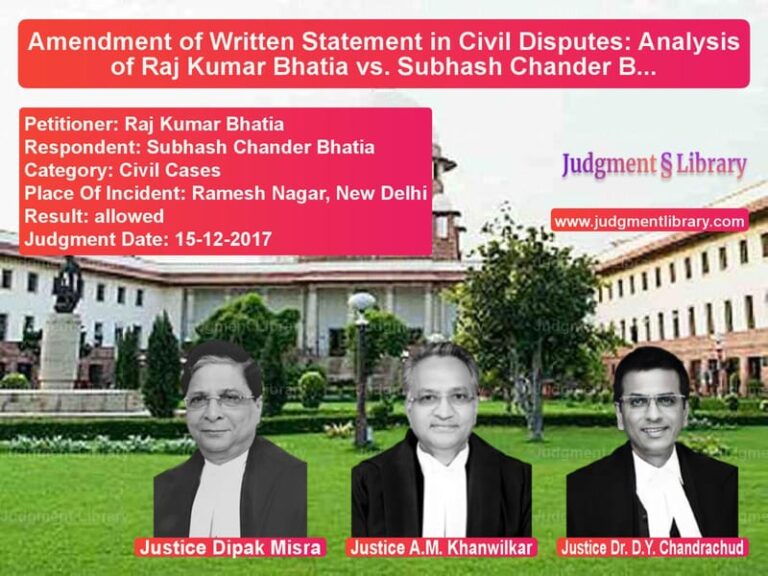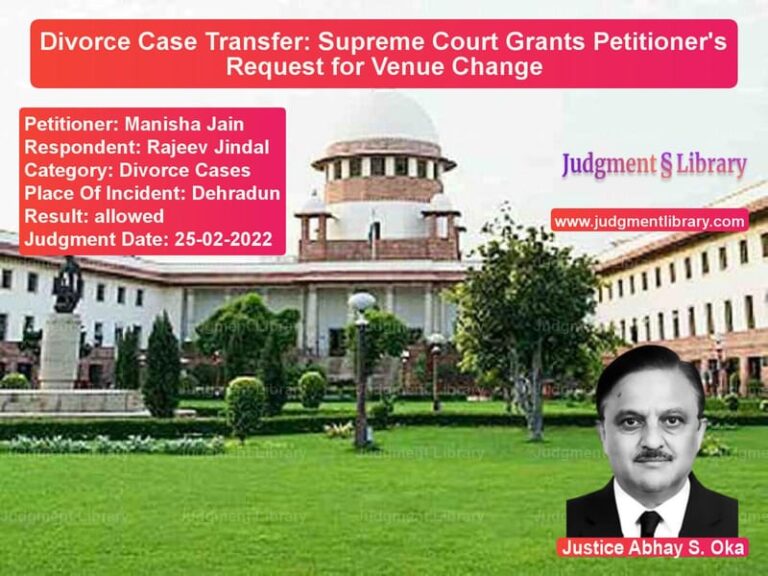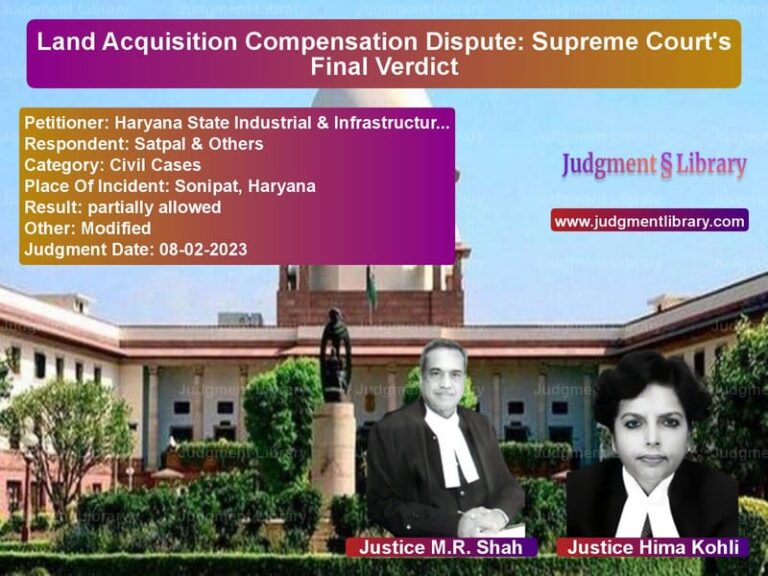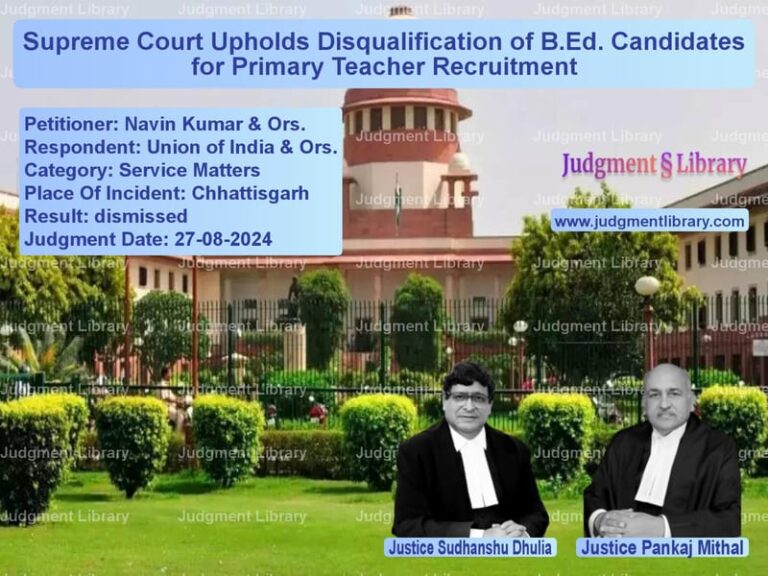Supreme Court Denies Interim Bail for Election Campaigning: Analyzing the Legal Implications
The Supreme Court of India recently heard a case that delved into the complex issue of whether a person, who is under judicial custody for serious criminal charges, should be granted interim bail for the purpose of election campaigning. The case, involving Mohd. Tahir Hussain, an accused in the 2020 Delhi riots, highlighted the tension between the right to contest elections and the State’s duty to maintain public order. The petitioner sought interim bail to campaign for the 2025 Delhi Legislative Assembly elections. The case raises significant questions about the balance between an individual’s constitutional rights and the gravity of criminal charges.
In this case, the petitioner, a former councilor of the Aam Aadmi Party (AAP), was arrested for his alleged involvement in the riots and the murder of Ankit Sharma, an Intelligence Bureau officer. Despite multiple charges and his ongoing incarceration, Hussain sought interim bail to be able to campaign for the upcoming elections. His application for interim bail was initially denied by the High Court, but the matter was escalated to the Supreme Court. The key legal question before the Court was whether granting interim bail for the specific purpose of campaigning could be justified, given the serious allegations against the petitioner.
Background of the Case
The petitioner, Mohd. Tahir Hussain, was arrested in connection with FIR No. 65 of 2020, registered in relation to the Delhi riots of February 2020. He faced multiple charges, including rioting and the murder of Ankit Sharma. Hussain had been granted bail in several cases but remained incarcerated in connection with the present case, as well as a case under the Prevention of Money Laundering Act (PMLA). Despite being in judicial custody, Hussain filed an application seeking interim bail from January 14, 2025, to February 9, 2025, for the purpose of contesting the upcoming Delhi Assembly elections.
Hussain’s application was first considered by the Delhi High Court, which allowed him to file his nomination papers for the election but denied his request for interim bail to campaign. The High Court ruled that the right to contest elections was not a fundamental right but a statutory right. The Court did, however, grant custody parole to allow Hussain to file his nomination. Dissatisfied with the High Court’s order, Hussain filed a Special Leave Petition (SLP) in the Supreme Court, arguing that the denial of interim bail severely impacted his ability to campaign and communicate with the electorate.
Key Legal Issues
- Whether interim bail should be granted to an accused person specifically for election campaigning purposes.
- The distinction between the statutory right to contest elections and the broader constitutional rights of a citizen.
- The possible misuse of interim bail by individuals facing multiple criminal charges, using it to gain an electoral advantage.
- The relationship between the right to contest elections and the right to vote, particularly in the context of an accused person in custody.
Arguments of the Parties
Petitioner’s Arguments
The petitioner, represented by Senior Counsel Mr. Siddharth Aggarwal, made the following arguments:
- The petitioner has been in custody since March 2020 and has not been granted bail in the current case and two other related cases, including the PMLA case.
- The petitioner has a right to contest elections, and not allowing him to campaign violates his fundamental rights as a citizen, as it restricts his ability to communicate his vision to the electorate.
- It is unfair to limit the petitioner’s right to contest elections by denying him the opportunity to campaign, especially when he has already been granted permission to file his nomination.
- The petitioner has an unblemished record as a councilor and was only accused of involvement in the riots due to political reasons. His past service and the fact that other accused persons have been granted bail supports his claim for interim bail.
Respondents’ Arguments
The respondents, represented by Mr. S.V. Raju, Additional Solicitor General of India, countered the petitioner’s arguments with the following points:
- The right to campaign for elections is not a fundamental right; it is a statutory right. The petitioner has been granted the right to file his nomination papers, which fulfills his statutory right to contest the elections.
- Granting interim bail for campaigning purposes would open the floodgates for other accused persons to seek similar relief, potentially leading to the misuse of the bail system for electoral gains.
- The petitioner’s involvement in serious criminal activities, including rioting and murder, disqualifies him from being granted interim bail for the purpose of campaigning. The Court should not allow an accused person to interact with the public and potentially tamper with witnesses.
- The concern that granting interim bail would be prejudicial to the ongoing trial is significant. The Court must ensure that the petitioner’s release does not affect the trial process or the integrity of the judicial system.
Supreme Court’s Observations
The Supreme Court, after considering the arguments from both sides, made the following observations:
“The right to contest elections, while important, does not automatically extend to the right to campaign during a criminal trial, especially when the accused is involved in serious criminal activities. The Court has to balance this right with the seriousness of the criminal charges against the petitioner. The petitioner’s involvement in the riots and the murder of an intelligence officer cannot be overlooked. Furthermore, granting interim bail for the purpose of campaigning would create a dangerous precedent.”
The Court also noted that the petitioner had not been convicted and was only an accused in multiple cases. However, the seriousness of the charges and the potential for public unrest if he were allowed to campaign while in custody weighed heavily on the Court’s decision.
Final Judgment and Directions
The Supreme Court, in its judgment, held:
- The petitioner’s request for interim bail for campaigning was dismissed.
- The Court upheld the High Court’s decision to grant the petitioner custody parole for filing his nomination papers but denied permission for him to campaign.
- The Court emphasized that granting interim bail for campaigning could lead to an abuse of the legal process and undermine the integrity of the judicial system.
- The petitioner was allowed to file his nomination and participate in the election as a candidate but was prohibited from actively engaging in campaigning activities during his release on parole.
Implications of the Judgment
This judgment sets a significant precedent for the rights of candidates facing serious criminal charges and the limits of their participation in elections. The ruling clarifies that while individuals have the right to contest elections, this right does not extend to the right to campaign during ongoing criminal proceedings, especially when the charges are serious and involve violent crimes. The decision also highlights the Court’s role in ensuring that electoral processes are not manipulated through the misuse of interim bail.
Conclusion
The Supreme Court’s ruling in Mohd. Tahir Hussain v. State of NCT of Delhi sets a clear precedent for cases where individuals under custody seek interim bail for election purposes. The ruling ensures that the election process remains fair and undisturbed, even when an accused person wishes to participate. The case also underscores the importance of judicial discretion and the need to balance individual rights with public safety and justice.
Petitioner Name: Mohd. Tahir Hussain.Respondent Name: State of NCT of Delhi.Judgment By: Justice Pankaj Mithal, Justice Ahsanuddin Amanullah.Place Of Incident: Delhi.Judgment Date: 22-01-2025.
Don’t miss out on the full details! Download the complete judgment in PDF format below and gain valuable insights instantly!
Download Judgment: mohd.-tahir-hussain-vs-state-of-nct-of-delh-supreme-court-of-india-judgment-dated-22-01-2025.pdf
Directly Download Judgment: Directly download this Judgment
See all petitions in Bail and Anticipatory Bail
See all petitions in Employment Disputes
See all petitions in Promotion Cases
See all petitions in Judgment by Pankaj Mithal
See all petitions in Judgment by Ahsanuddin Amanullah
See all petitions in dismissed
See all petitions in supreme court of India judgments January 2025
See all petitions in 2025 judgments
See all posts in Criminal Cases Category
See all allowed petitions in Criminal Cases Category
See all Dismissed petitions in Criminal Cases Category
See all partially allowed petitions in Criminal Cases Category







